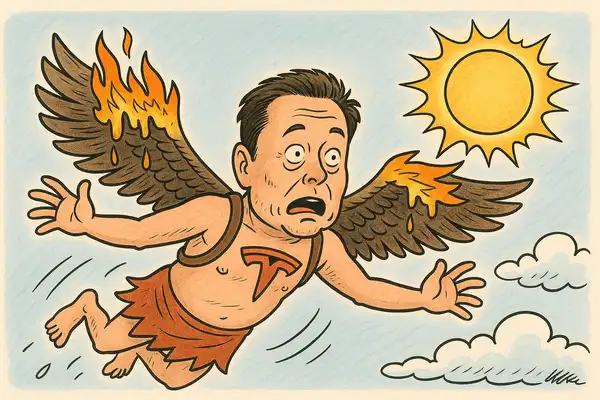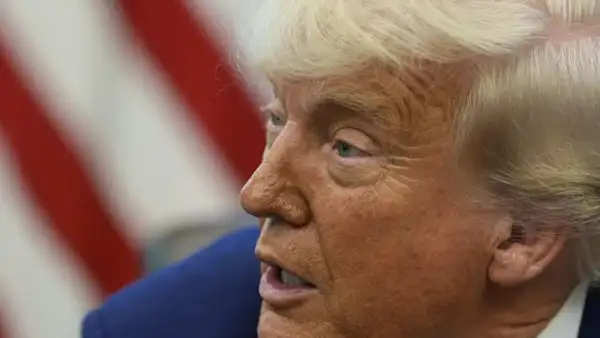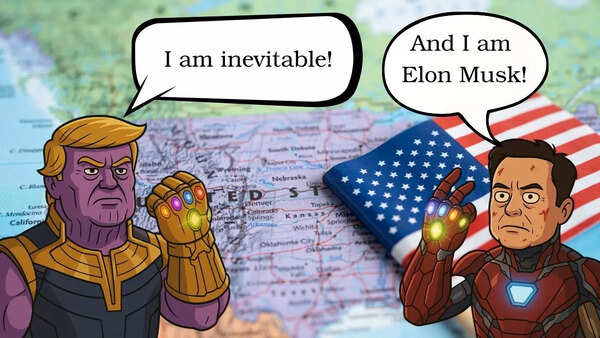The Icarus of DOGE
In Greek myth, Icarus ignored the warnings. Armed with wings of wax and ambition, he soared toward the sun—only to plummet when the heat proved greater than the flight.In 2025, Elon Musk arrived in Washington as Trump’s Icarus. His wings weren’t feathered—they were algorithmic. His torch wasn’t divine—it was a chainsaw. And his goal wasn’t escape, but dominion: dismantle the federal bureaucracy, slash $2 trillion in waste, and bend Washington’s sluggish machinery to the tempo of Silicon Valley.But the laws of political gravity, like myth, remain unchanged. And just four months after landing with fanfare, Musk is exiting the capital—not as a conqueror, but as a case study.

A Collision Course with Washington
From the start, Musk styled himself less as a policymaker and more as a disruptor-in-chief. Leading the newly created Department of Government Efficiency (DOGE), his mission was to drag federal agencies out of what he saw as a bloated malaise.His approach was rapid and aggressive. Musk and his DOGE team roamed the bureaucracy like a rogue consulting firm—demanding access, slashing budgets, implementing productivity mandates, and declaring war on “wokeness.” For a while, it worked. Headlines soared. MAGA influencers cheered.But within weeks, the backlash began.
The Shouting Match Heard by the President

Trump administration asks Supreme Court to block watchdog access to DOGE documents (Photo: AP)
The breaking point came in March. Musk bypassed Treasury Secretary Scott Bessent to install a new IRS commissioner—an act that triggered one of the most dramatic hallway confrontations in recent White House memory.“F*** you! F*** you! F*** you!” Bessent shouted at Musk, loud enough for President Trump to hear. Their argument spilled through the West Wing, Musk needling Bessent’s financial record, Bessent refusing to back down.In the end, Bessent prevailed. Musk’s candidate lasted three days. The power struggle was over—and so, increasingly, was Musk’s influence.
Chain Saws, Bullet Points, and Bureaucratic Resistance

What followed was a slow-motion unraveling. Musk’s claims of saving trillions were quietly revised to $170 billion. Courts halted layoffs. Agencies reinstated programs. Cabinet secretaries pushed back on reforms they said would gut essential services.Trump’s tone shifted. After Musk theatrically wielded a chainsaw onstage, the president distanced himself: “We say the scalpel rather than the hatchet,” he posted.Inside government, civil servants ignored DOGE directives. “How many people were fired because they didn’t send in their three things a week or whatever the fuck it was?” one adviser asked rhetorically. “Everyone is ready to move on from this part of the administration.”
The Cabinet Revolt

Marco Rubio
The tipping point came at a closed-door Cabinet meeting. Musk, still riding high off his outsider bravado, walked into what turned out to be a coordinated revolt.Secretary of State Marco Rubio, still stung by DOGE’s gutting of USAID, pushed back. So did VA Secretary Doug Collins and Transportation Secretary Sean Duffy. Musk defended his pace and methods, citing the need to replace fired staff with better hires—but by then, the opposition had crystalised.Even Trump, sensing the tide, began cooling publicly. And with that, Musk’s centrality in the administration began to erode.
A Political Misfire in Wisconsin

Elon Musk was spotted wearing a cheesehead hat during his speech at Wisconsin Town Hall. The Tesla CEO also took a dig at George Soros, the chairman of Soros Fund Management.
Outside DC, Musk’s political instincts fared no better. In Wisconsin, he campaigned for a conservative state Supreme Court candidate, wearing a cheese hat and turning himself into the story.Democrats pounced. The liberal candidate won by ten points. The GOP stopped mentioning Musk. Fundraising emails that once name-checked him vanished. Even Trump’s Truth Social account, once brimming with Musk praise, went quiet.One Republican operative was blunt: “He polls terrible. People hate him.”
Friction on Trade and Foreign Policy
Internally, Musk also clashed with the administration on policy. He pushed a zero-tariff trade model—at odds with Trump’s economic populism. He publicly insulted Peter Navarro. A proposed Pentagon briefing on China triggered backlash over conflicts of interest, forcing Trump to disavow any such meeting.Even Steve Bannon took notice. “The fever had been broken,” he texted. Musk, once seen as a strategic partner, had become a liability.
DOGE Without Musk
Musk’s status as a “special government employee” always had a shelf life—130 working days. There was chatter about extending it. That chatter has since ended.His team, however, remains embedded. DOGE alumni now serve at the Departments of Energy and Interior. The White House insists the mission continues: “DOGE employees who onboarded at their respective agencies will continue to work with President Trump’s cabinet to make our government more efficient,” said press secretary Karoline Leavitt.But Musk’s personal imprint is fading. Even he seems ready to step back. “I think I’ve done enough,” he said at the Qatar Economic Forum.
Chain Saw or Chisel?
Some believe Musk’s impact, though messy, was not meaningless. “He got a few big nicks,” said Appian CEO Matt Calkins. “But we probably didn’t need the chain saw. We needed the chisel.”Others are more sceptical. “They haven’t added any value,” said Ayushi Roy of Harvard Kennedy School. “They’ve just been deleting things.”Even Musk’s much-hyped fraud detection in Social Security turned out to be a red herring. Payments to those flagged individuals had already been stopped—well before DOGE flagged the anomaly.At agencies like the FAA, where Musk’s cuts triggered operational delays, the recovery is still ongoing.
ENDGAME

Musk insists DOGE can survive him. “DOGE is a way of life,” he told reporters. “Like Buddhism.” Asked whether it needs him to function, he replied, “Is Buddha needed for Buddhism?”But myth has a way of catching up.Musk entered the capital like a force of nature—a billionaire disruptor poised to rewire the republic. He exits with some cost savings, a few loyalists, and a long list of agencies quietly reversing his reforms.The Icarus analogy remains irresistible—not because Musk fell, but because he thought he wouldn’t. In Washington, where survival depends less on vision and more on consensus, his greatest miscalculation wasn’t the budget—it was the belief that raw will could outfly process.And in the end, the wax melted. The wings failed. And the swamp, as always, remained.With inputs from agencies



